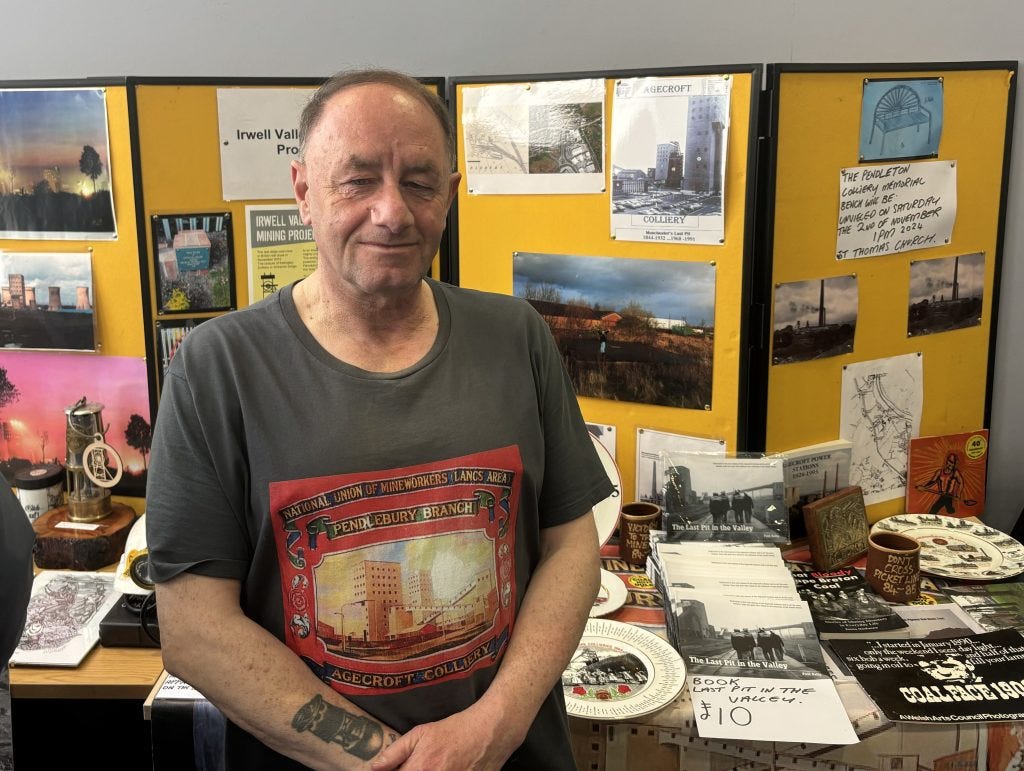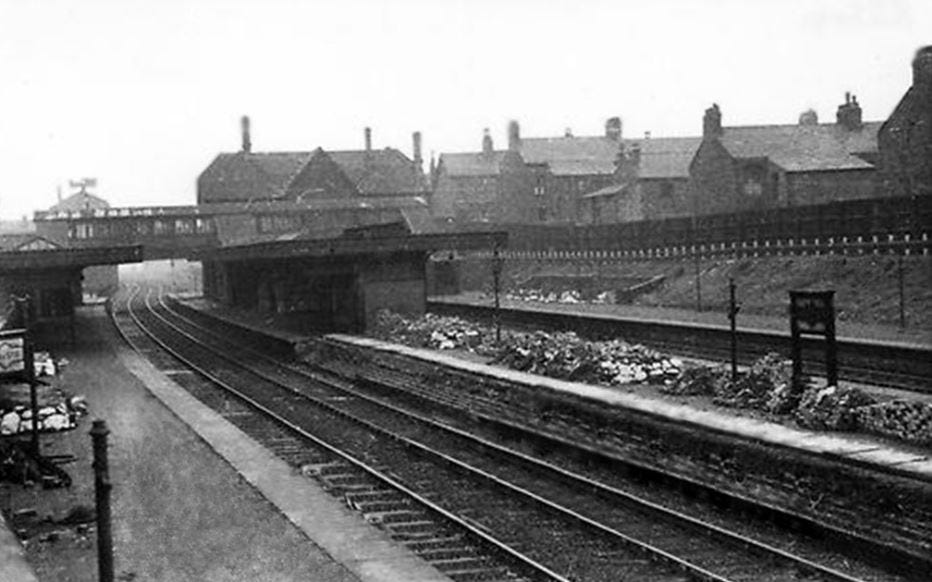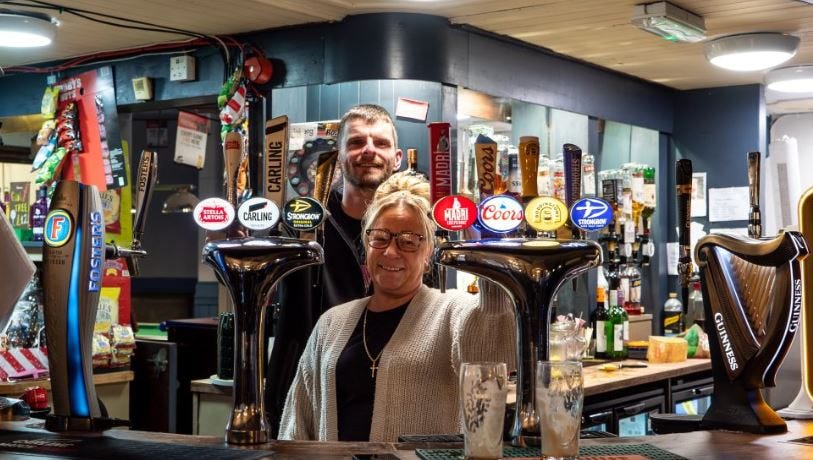"It was revenge" – 50 years since Thatcher became Tory leader, bitterness remains in Salford
The former PM's legacy still provokes hostility in the city, 50 years since she took over as leader of the Conservative Party.
In this week’s newsletter, we look back at how Salford views Margaret Thatcher and her legacy as Prime Minister, five decades after she won leadership of the Conservative Party.
We also look at how changing times and habits spell uncertain future for beloved Eccles pub; a man in Irlam, who is taking on a 240km solo cycle to raise money for a mental health awareness charity; and a school in Salford that has introduced new darts and chess clubs.
If you enjoyed it please forward this newsletter to someone who might enjoy it. Got a tip? Let us know at Now@Salford.ac.uk
“We are paying the price for it now”
50 years ago, this week Margaret Thatcher beat Edward Heath to become leader of the Conservative Party.
Known for her controversial right-wing economic and political views, Thatcher served as Conservative leader for fifteen years and was Prime Minister for eleven. But more than 30 years after she left government and over a decade since her death, the ‘Iron Lady’ still elicits strong feelings in Salford.
Keith Marchant’s view is typical of the posts we received on Facebook when we asked whether her legacy has been good for the city. He said: “Let's see. Sold oil, gas, and communications. Failed to invest in schools and hospitals, four to six million unemployed depending on whose figures you believe. Sold all public owned housing.”
Those sentiments were echoed by Tony DasRymer, who stated: “I was child. But there was a lot of industry at the start of the 80s and by the early 90s a lot of it was gone. Maybe things needed to change but it feels like her government did very little to help those people who were made redundant.”
“She was a disaster for Salford and many working-class communities,” said Alex Channon. “Her legacy lives on in food banks today.”
During her time as Prime Minister, Thatcher found herself at odds with trade unions across the nation and proposed to limit the powers they had. That, along with an industrial strategy that favoured privatisation and closures, particularly of the nation’s coal mines, led to the miners’ strike of 1984-85.

These strikes also reached Salford, where hundreds of miners, who worked at Agecroft Colliery in Salford, took industrial action.
The colliery, situated in Pendlebury, was much more urbanised than other villages that hosted miners, and thousands of working-class people were employed there.
But it wasn't just miners that worked at Agecroft; the colliery also had a power station, and brickworks attached, as well as employing plumbers, electricians, and a variety of other roles.
Paul Kelly worked at Agecroft from 1978 until its closure in July 1990, when he was aged 41. He says that the first signs of what was to come was the announcement that mines across South Wales were set to close after being deemed “uneconomic” by the Conservative government. By 1984 the programme of pit closured had accelerated.
"Everyone just walked out; all across the country they were striking."
20 pits were scheduled to close, with more on the chopping block across the nation. About three-quarters of the country's 187,000 miners went on strike to oppose the closures, which were expected to mean 20,000 job losses.
Agecroft joined the myriads of other pits on strike in March of 1984. This proved short-lived however, as not much later the miners of Agecroft held a vote, and chose to return to work, save for 150 people who chose to continue to strike, Paul Kelly was amongst them.
“We’ll decide our own fate, not them,” says Paul, recalling the mindset of the Salford miners who continued to strike.
“What was sad was their naivety, at the time,” he says of the miners who chose to return to work.

Strikers across the country, including Paul, held picket lines, and urged others to join their cause, while Thatcher and her government sought an end to the industrial action using force. Police began to be used to break up those on picket lines interrupting working miners.
In April 1984, Paul says he and a group of other miners were "beaten bloody” by the police while on the picket line. Eventually the miners returned to work, and the NUM a broken force. Paul returned to Agecroft, but things were never the same.
“After the strike, conditions just got worse,” he says."The work was still as hard, but the pay dropped, and the hours were longer. The unions couldn’t do anything.”
Agecroft Colliery remained open until 1990, when it was announced that the pit, which had opened in the 1840s, was closing for good.
Paul said this closure hit the workers in and around Salford hard – and is in no doubt as to who he blames.
“It was political," he states. "It was revenge for the first strike, and Thatcher had in in for us.”
The closure of Agecroft left many young men “hopeless,” with no future, especially the rural workers who travelled into Salford to earn a living.
Paul said multiple miners ended their own lives following the pit closing.
“This was replicated in every pit village across the country,” he adds.
The closure of Agecroft, and various other collieries across Salford and the Northwest, was a sort of precursor to the economic slump Salford found itself in post-deindustrialisation, argues Paul.
“Once the pit went, all the industries went with it. Thatcher called it fair trade: she privatised everything, and she destroyed our industries.”
Paul now spends his time honouring and commemorating the workers of collieries across Salford, and authored a book, The Last Pit in the Valley, about all the people who were involved in Salford’s mining industry.
A line on the website of his organisation, the Irwell Valley Mining Project, sums up his feelings on the industry – and community: “Our pits and our way of life may be gone but our memories live on."
Similarly, 50 years on from her rise to leadership of the Conservative Party, Margaret Thatcher’s impact still lingers amongst Salfordians.
“We are paying the price for it now," says Paul. "She let her people down.”
Changing times and habits spell uncertain future for beloved Eccles pub
The Dutton Arms in Eccles has been serving the people of Salford for generations, but with changing times, rising costs, and changing social habits its landlords fear for the future of the pub.
Charismatic husband-and-wife team Donna and Matt Shaw, who run The Dutton Arms, on Barton Road in Barton-upon-Irwell, say that as the areas has changed, so too have drinking habits.
Donna is worried about the future of the pub. “We’ve got the back end of it now,” she says nostalgically. “We’ve got another five years left, and that’s it.” Read more here.
Irlam man takes on 240km charity cycle challenge for mental health awareness
A man in Irlam is taking on a 240km solo cycle aiming to raise money for a mental health awareness charity.
Adam Pike, 19, Irlam, is taking on a solo cycling challenge in the effort to raise £1500 money for the Jamie Horrocks Trust.
The charity that set up in memory of his uncle Jamie, a firefighter from Irlam, who sadly took his own life in 2013, aged 36. Read more here.
Local building society donates £100,000 to Salford Youth Zone ahead of the summer launch
Salford Youth Zone has confirmed that a building society has become the latest donor to support the charity’s brand new facility.
Manchester Building Society has supported the Salford Youth Zone by committing £100,000 over the next four years. Read more here
Salford City Academy’s new chess and darts clubs take off with student
A school in Salford has introduced new darts and chess clubs as a part of its latest enrichment scheme.
Salford City Academy is giving students the chance to develop strategic thinking, concentration, and confidence.
The two clubs are also being encouraged to members of the school as a new way to meet people and communicate. Read more here.
What’s On in Salford this week
🎭 The Merchant of Venice 1936 - The critically acclaimed production of The Merchant of Venice 1936 will be heading to the Lowry in 2025. The theatre production of Shakespeare’s enduring classic is back by popular demand and will feature at the Lowry from 25 February – 1 March 2025. Find out more here.
❤️ Weaste and Seedley Social Club is hosting a Valentine’s Day Party on Saturday February 15, with music, games and karaoke from 7pm. Guests can expect everything from Stevie Wonder to Whitney Houston, plus the chance to step up and take the mic. Find out more here.
⚽ Salford City will travel to London this weekend, as they direct their attention to AFC Wimbeldon as their ambitions for the playoffs continue - the 12:30pm kick off will see them looking for back to back wins. Find out more here.
Our photo of the week: Weaste train station

Weaste Station was situated on George Stephenson's famous Liverpool and Manchester Railway — the world's first railway to cater for passengers as one of its primary functions.
Early timetables show a number of names being used including Waaste Lane, Weaste Lane Gate and Weaste Lane with the later in use by the mid 19th century. In 1856 the station was renamed as Weaste.
The station was an early closure, losing its passenger services in 1942, and remained in use for goods until November 1947.
During the 1980's the M602 Motorway was constructed adjacent to the Liverpool and Manchester Railway at this point. Today nothing remains of the station site.
Thank you for reading
All our journalism is written by people working, studying and living in Salford – for the people of Salford. We'll be adding more exclusive writing to future editions. If you value local journalism sign up: it’s free, easy and we’ll never share your data.





